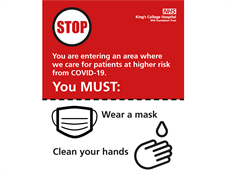Preventing infection
Here we explain how you can help prevent and control infection when you come to our hospitals.
Wear a face mask in clinical areas where indicated

Face masks are required in a small number of clinical areas, specifically those areas treating patients who are a greater risk from COVID-19 infection (i.e. patients who have a weakened immune system). Patients and visitors are no longer required to wear masks in other areas, but if you choose to wear a mask, we fully support your right to do so.
Areas where masks are required will be clearly marked with signage, pictured here.
Patients
- Wash your hands regularly and carefully with soap and water or use a alcohol hand rub:
- whenever your hands are dirty
- before and after eating your meals, using either soap and water or wipes
- after using the toilet.
- Let staff know immediately if you have diarrhoea, vomiting, or if you think may have a respiratory infection such as COVID-19 or flu
- Bring your own personal toiletries with you, such as flannels, sponges, moist hand wipes and razors, and do not allow others to use them.
- Ensure you have regular washes, showers or baths, where available. Please ask our staff if you need any assistance.
- Avoid using bars of soap – use the liquid soap we provide instead.
- Expect staff to have washed their hands before having direct contact with you.
- Please remember that you can ask our staff to wash their hands. They will be happy to do so, as your health is our priority.
- Keep your room or bed space tidy and uncluttered, so it can be cleaned more easily.
- Expect your room to be cleaned every day.
- Expect to have fresh bed linen at least once a week.
- Tell the nurse in charge if you are concerned about cleanliness.
Visitors
- Plan your visits so there are only two people at the bedside at any one time. See the Visiting page for more information on visiting times.
- Do not come to the hospital if they feel unwell, have a temperature, or have had diarrhoea or vomiting within the last 48 hours.
- Wash your hands before entering a ward. Wash basins and hand gel are available throughout the hospital.
- Use the public toilets, not the patient toilets on the wards. This reduces the risk of cross-infection.
- Sit on a chair and not a hospital bed.
- Do not bring in latex balloons, flowers and plants. These can be an infection risk or cause an allergic reaction for other patients and staff.
- Wear protective equipment, such as face masks, aprons and gloves, if asked to do so.
Further information
For more information about specific infections, see our leaflets on:
- Carbapenemase-producing enterobacterales (CPE)
- Clostridioides difficile
- MRSA information for patients and visitors
- Norovirus
If you have any concerns or questions, contact the ward manager of the ward or area you – or your relative or friend – are being treated in. Alternatively, contact the Infection Control Team on 020 3299 4374 or [email protected].
